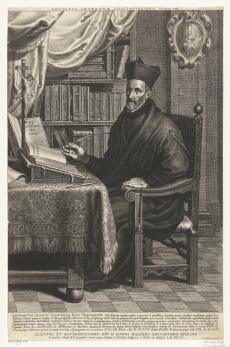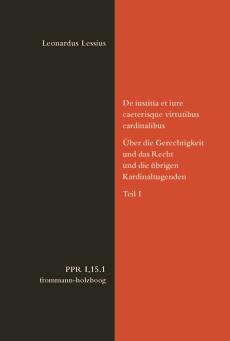“Important pioneer of European business ethics”
Legal historians in Cluster of Excellence make the work of Dutch legal scholar and moral theologian Leonardus Lessius accessible for the first time – Developed innovative legal and ethical principles – From private law to confession – First volume of edition
Press release of the Cluster of Excellence from 28 September 2020

The Latin work of an important pioneer of modern business ethics, the Dutch legal scholar and moral theologian Leonardus Lessius (1554-1623), is being made available in German for the first time. The legal historian Nils Jansen from the Cluster of Excellence “Religion and Politics” at the University of Münster, who is publishing the edition and translation of Lessius’ main work, On Justice and Law, comments: “Like hardly any other scholar of his time, Lessius was familiar from his observations in Antwerp and Frankfurt with the new practice of trading in money, futures and insurance. Drawing on natural law to build a casuistry of confession, he dealt with these observations in such an up-to-date and practical way that his work became a bestseller and went through fifteen editions during his lifetime”. The first of ten volumes will be published by frommann-Holzboog Verlag next week.
Taking the perspective of moral theology, Lessius is concerned with everything that appears important for spiritual salvation and confession: contracts, inheritances, and donations; political decisions, mineral resources, and hunting rights; marital matters, seductions, and the right amount of alcohol. “From a legal point of view, the private law that Lessius develops rests on principles that are still valid today: freedom of contract and protection of property and physical integrity”. The text became a standard work soon after its publication in 1605, as Jansen points out. “Lessius’ readers were initially Jesuits and priests, who could use the work in all moral questions of pastoral care”. The work was then read by the religious, legal and political class of the time, especially in the Catholic territories of Northern Europe.
Lessius considers the actions of people from the perspective of both law and moral theology, and carefully distinguishes secular and canonical law on the one hand, from natural law that is decisive for moral theology on the other. The work comments on Thomas Aquinas’ Summa theologiae, forms a compendium on the late-scholastic discussions in the 16th century, and became a main source for the theory of natural law developed by the philosopher and theologian Hugo Grotius (1583-1645). “The work thrives on Lessius’ detailed knowledge of the economic practices of his time, and is central to the legal history of Europe and the business ethics developing there”.

Forgotten in the 19th century, rediscovered in the 20th century
According to Jansen, the book’s success can be explained by the fact that it combined theological and legal perspectives, and provided experts with much more concise and up-to-date information than competing works. “Using clever allegations and references to older writings, he brought the entire jurisprudential discussion to one issue – and devoted himself in his casuistry, in his moral-theological evaluation of individual cases, to issues that are still topical today. One example: are bankers allowed commissions in transactions involving the exchange of money? Lessius makes a distinction: there is no commission for pure custody, but there is a commission for profit made with money in custody. Another case: what must the usufructuary do when trees that he uses perish? He must replace the dead trees, but not in cases of force majeure such as storms.
Despite its extraordinary success in the 17th century, Lessius, like late scholasticism in general, was almost completely forgotten in the 19th and 20th centuries. According to Jansen, the dawn of modernity made this type of scholastic theology, the Catholic-Thomist discourse on natural law of the 16th and 17th centuries, uninteresting at first. But then in the course of the 20th century, Lessius first came into the focus of economic history because of his approaches to economic theory, and later of legal history, political theory, and theology as a significant representative of the “Seconda scolastica”. Jansen: “With the reopening of this early-modern discourse on natural law, a discourse that has had a lasting influence on the political-legal language of the modern period, Lessius has also became a better known name”.

Challenges of translation
“Translating the work into German is a particular challenge, as there are still hardly any dictionaries available today that make accessible how the Latin language was used in the 15th and 16th centuries”, explain the philologists and translators Konstantin Liebrand and Klaus Wille. “There is a lack of modern historical dictionaries on theology, philosophy, and canon law. Here, the translator is partly dependent on comparisons with other works of the time, but much results from the translator’s ever increasing familiarity with the text genre”. The first of the ten volumes makes available in German 71 of the 800 pages of Lessius’ main work, De Iustitia et Iure caeterisque virtutibus cardinalibus. The work was first published in 1605, but the edition is based on the last edition published by Lessius himself in 1618. The previous editions, some of which differ considerably, have been incorporated critically into the edition published. The next four volumes of the edition will be published within the next three years. (vvm)

